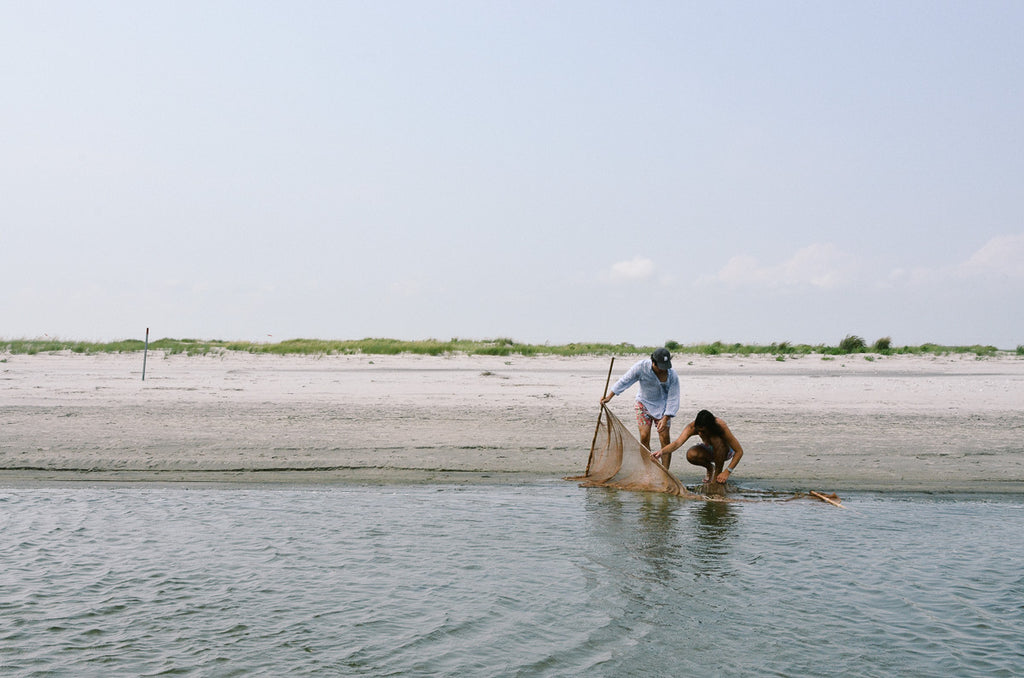We launched the SS Shofu, a modest fishing vessel, in 2007 with little expertise, my father, brother, and I, thinking that because we were Japanese, fishing might come naturally to us. Since that time we have made little headway, drifting through the inlets, beaching on the shoals, and coming home at the end of the day with sunstroke, seaweed, and little else. It was a pastime that appealed, in theory, to our own ideals of rugged individualism, getting back to the basics of life, and eating well. In the rare event that we actually caught something, it was given the full Japanese treatment: killed by ikejime, cleaned with a deba knife, and often sliced thinly as sashimi with a yanagi-ba. Usually, though, that time would be spent driving to the seafood market, to buy what we had failed to catch ourselves.
As amateur summer fishermen, the real prizes have always been out of reach—the striped bass, too late; the tuna, too far; and the most popular summer catch around here, flounder, is of little gastronomic interest to us. In the familiar position of planning another fishless dinner, we returned to Euell Gibbons’s classic Stalking the Blue-Eyed Scallop, for a look at what might be possible on terra firma. Best known for his foraging manual Stalking the Wild Asparagus, Gibbons turns his attention in this followup book to the coastal tidewaters of the Northeast and occasionally beyond, yielding unexpected gems of our gastronomic inheritance. Rather than focusing on big game fish, he champions more obscure sea creatures like smelts, dog whelks, and the titular blue-eyed scallop. Part field guide, part cookbook, part memoir, Gibbons pulls a feast out of the oceans, bays, and tidal creeks that I grew up with but, evidently, barely knew.


Gibbons’s holistic approach gave me the idea to revisit our old seine net, a simple rectangle of fine mesh connected by two long wooden handles my father purchased from a bait and tackle shop some thirty years ago. It was our childhood ritual every summer, going to the point where the ocean meets the bay, and dragging the net through the shallows to see what we could catch. As the youngest in the family, it used to be my job to scurry in from the opposite direction, a job I relished, screaming and charging to chase the fish into the net’s path. Now I take my turn as the inner pillar of the operation, the lanky fulcrum, while my brother, who is shorter and stronger, spins around the way to seal off their escape. After each haul, our dad, who handled the other post, would run and grab his little Panasonic camcorder to film the highlights, narrating the scene in his slow, deliberate baritone like a Japanese Werner Herzog.
August. Stone Harbor Point. Pipefish.
With these memories in mind we took the weathered net from the shed and made it to the tip of the island in time for low tide. A line of shore birds and their human admirers appeared along the horizon as we reached the dunes: piping plovers tiptoeing around the ebbing shallows, terns and falcons circling overhead, with a gang of cawing seagulls ready to pick up anything left behind. Spotting the narrow pools trapped in the flats between the ocean and bay, we unfurled the net to begin.



The beauty of seine net fishing is its instant gratification, targeting smaller fish that are less capable of escape. As we pulled up net after net of sparkling little fish, childhood ingenuity met with adult strength. It used to be all sport, exploring the tidal pool of its seahorses, blowfish, crabs, weak fish, and mini stripers, before releasing them back into the current. These days, in the spirit of Euell, we take a few dozen of the poor silversides, the most abundant and least interesting, back in a bucket to be fried and devoured whole for a late dinner.
Seated around the table, we recall our day’s exploits, our comical heroism, like the flying plastic bag I chased down at full speed before a diving catch at the roped-off edge of the bird sanctuary. The simple taste of fried fish, sprinkled with sea salt, is enough to erase the bitter taste of bluefin dreams deferred, and a true feast unto itself.
By Jeffrey Ozawa
From the Gorumando blog archives, originally published in September 2013


